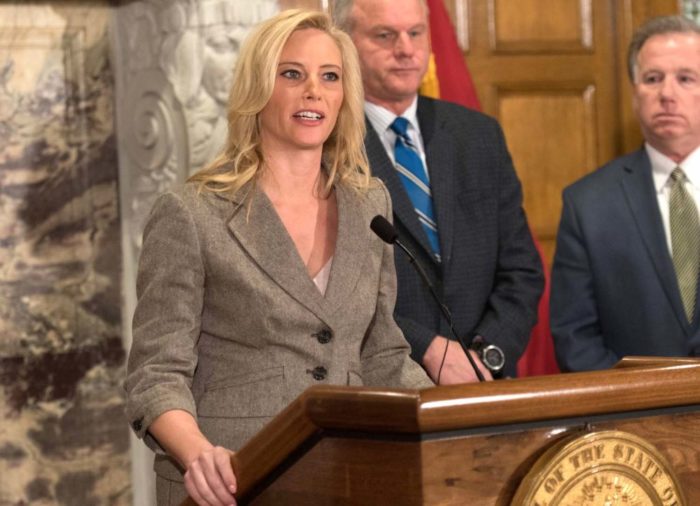TRUCKERS, CONSTRUCTION FIRMS READY TO ROLL WITH ARKANSAS HIGHWAY PLAN

Shannon Newton, president of the Arkansas Trucking Association, speaks during Monday’s news conference to unveil a $300 million plan for state highways as Senate President Pro Tempore Jim Hendren (center) and Arkansas Good Roads Foundation Executive Director Joe Quinn look on. (Photo courtesy of Governor’s Office)
By Sarah Campbell-Miller, Arkansas Business, Feb. 14, 2019
While Gov. Asa Hutchinson’s $300 million per year plan to maintain Arkansas’ roads and bridges will raise diesel prices for truckers, they’ll eventually come out ahead through time saved and fewer equipment repairs, the Arkansas Trucking Association said this week.
The ATA, which represents more than 300 trucking firms and associated industries in Arkansas, was front and center with the Republican governor on Monday, when he and legislative leaders unveiled their long-awaited plan to meet longstanding highway needs.
ATA President Shannon Newton said the plan is “unequivocally” what the group had hoped for — one that would have a “meaningful impact” in addressing highway maintenance needs, even though it falls short of the half-billion dollars some studies have said the state needs to keep up Arkansas’ sprawling network of roads and bridges.
But, Newton said, “I think it strikes a great balance between, as the governor mentioned, what we need and what we can afford.”
The largest part of the plan — a permanent extension of an existing half-cent sales tax for highways that would generate about $205 million per year — would be up to Arkansas voters. Legislators must vote to refer the matter to the November 2020 ballot.
The remaining $95 million would come from:
• An indexed tax hike on gasoline (3 cents per gallon) and diesel (6 cents per gallon), which would raise $58 million per year;
• New registration fees on electric and hybrid vehicles, which would raise $1.9 million per year; and
• Tax revenue from Arkansas’ new casino gaming centers, which would raise at least $35 million per year.
The plan would also raise $110 million a year for cities and counties to maintain local streets.
Newton said that increase to the diesel tax is expected to cost the state’s trucking industry $41 million per year. But the industry is happy to pay if it means better, more navigable roads and less wear and tear on trucks. She points to studies that show that equipment maintenance costs and the cost of drivers’ time in congestion or rerouting are mounting for the industry.
“And we feel like we would like to invest proactively and spend money to make the roads better so that they are safer, so that they are easier on the equipment, so that the volume of traffic can move more freely,” she said. “The benefit of those things outweighs the increased costs.”
Newton said better roads could even lead to better driver retention, a well-known challenge for the trucking industry. She said it’s difficult to recruit drivers when they know they’ll be stuck in traffic or have to endure roads that are uncomfortable.
Newton expects the ATA to be involved in the 2020 campaign for voters to extend the half-cent sales tax, should the Legislature vote to refer it. She said educating legislators and the public about the plant’s benefits will be important, and added that the 3-cent increase in the gas tax would cost the average Arkansas motorist just $1.88 per month.
“We will have a role,” she said. “I just don’t want to overstate; we’re not going to be leading the charge as the tip of the spear on that issue.”
Arkansas Business also talked to construction companies and engineering firms about the highway plan and found them supportive, as well. But they said it’s too early to predict what specific opportunities would exist for their businesses if the plan is approved.
All are hoping for more details about specific road and bridge projects the Arkansas Department of Transportation will be able to pursue with the new and continued revenue.
“It will increase the market, so that’s good,” said Don Weaver, president of Weaver-Bailey Contractors of El Paso. “And the state needs it. We’ve been hoping for something like this for the last two or three legislative sessions, but it seems like the timing is right now. It [means our company is] able to plan and buy equipment, train and hire, hopefully give some hope for younger people wanting to join our industry.”
Mark Windle, vice president of operations for Manhattan Road & Bridge of Tulsa, said the plan is not “growth-oriented” to provide the $478 million some studies have said Arkansas’ highways require. But he called it a “reasonable compromise and certainly something that the state can work with and accomplish a good bit with.”
Matt Crafton, president and CEO of engineering firm Crafton Tull & Associates Inc. of Little Rock, said the firm is “very much in favor of … a long-term, sustainable highway funding mechanism for the state.”
“Our state badly needs it,” Crafton said. “We need good roads for safety and efficiency and traffic.” He added that having “a safe and efficient highway system is critical to the economy of our state.”
The nonprofit Arkansas Good Roads Foundation agrees. The group appeared alongside the governor and the ATA on Monday to endorse the plan.
President Dan Flowers said highways are built for safety, connectivity and to provide intermodal transportation for businesses. He said spending money on highways results in thousands of jobs and will add about $8.5 billion in economic activity over several years.
The foundation is not permitted to lobby, so it can’t financially support a campaign for the sales tax extension. But Flowers said it will work to educate the public about the plan.
